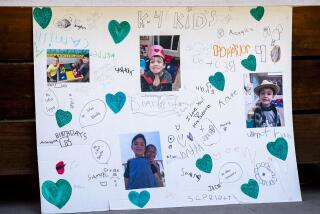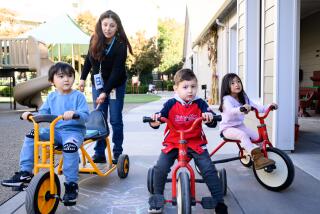PARENTING : Finding Outlets for Anger : Specialists say youthful outbursts of aggression are normal. But dealing with them effectively is a learned behavior and must be taught to children.
- Share via
Of all the challenges of parenting, dealing with a child’s bursts of aggression can be especially daunting.
Moments of pure, unadulterated anger may leave grown-ups wondering if their child is treading on dangerous psychological turf, or just exhibiting a normal expression of emotion.
Lynne Weinberg, a staff psychologist at the San Fernando Valley Child Guidance Clinic in Panorama City, says it is not at all uncommon for children, up to the age of 5 or 6, to exhibit some physical aggression, typically through hitting and angry outbursts.
“All kids are going to go through periods when they’re angry,” she said. “It doesn’t mean they are going to grow up to be criminals.”
Carol Lambert, director of the Woodland Village School, an Agoura preschool that enrolls children from 6 weeks old through kindergarten-age, agrees that it is natural for children to engage in some kind of aggressive behavior, such as pushing another child in an effort to be first in line, or pinching or hitting someone in frustration.
*
But while anger is normal, experts say, dealing with it effectively is a learned behavior and must be taught to children as well as demonstrated by parents. Parents can be particularly effective in coaching children through an angry moment, and also in providing outlets for rage: athletics, outdoor time--even a punching bag.
“A lot of kids these days spend a lot of time in school, in the car, without many outlets. Sports teams, outside time, free time--these are important,” said Weinberg.
When a child is hurting or threatening someone or damaging property, she advised, the first thing parents should do is to stop the particular act of aggression. After Mom or Dad has helped to subdue the child by using a calm, quiet tone of voice, and perhaps a timeout, the two can discuss what triggered the anger. The parent can then suggest reasonable outlets to use in the future--such as hitting a pillow or seeking adult remediation--and can help the child find words to express his or her feelings.
Parents can also assist children in learning to recognize signs that they’re getting angry. Their own loud voice or clenched fists, for example, might suggest that it’s time to pull away, use words to communicate their feelings, or get help from an adult, Weinberg said.
*
According to Weinberg, some parents take a child’s aggression personally; they see it as a sign of a lack of respect, or they think it’s directed at them, or that it indicates that they have made some major parenting mistake, said Weinberg. For adults who grew up with parents who yelled at or hit them, the natural reaction to a child’s aggression may be to yell or to spank, which serves only to recycle anger and upset everyone more, she advised.
Lambert has found that it helps for parents to tell children that there is nothing bad about feeling angry, as long as they find ways to handle the emotion without hurting others.
Asking children to evaluate angry episodes and consider other ways they could have handled themselves also helps because it illuminates future options. Some youngsters need to be told that it is all right to ask for a grown-up’s intervention. Others benefit from learning appropriate responses: “I won’t play with you if you throw sand in my face again,” or, “If you hit me, I’ll get the teacher.”
Weinberg encourages parents to insist that a child make restitution if someone is hurt or something is broken. Appropriate action might include apologizing, or fixing or paying for broken property.
*
While occasional outbursts of anger are no cause for alarm, recurrent aggression can be a sign of other problems, according to David Paster, an Encino-based child psychiatrist.
“Putting a child into a group (day-care) setting too early is an invitation to be aggressive,” Paster said.
Angry outbursts might also signal depression, attention-deficit disorders, violence at home or loneliness. Paster suggests that parents seek counseling if a child destroys property, threatens others with weapons or is self-destructive.
One Newbury Park mother of two preschool boys suspects that her children’s long days in child care contributed to her 5-year-old’s aggression at preschool. “He would knock the desk over, chase a teacher with a pencil--whatever it took to get the teachers to call me and have me take him home,” said Laurie, who asked that her last name not be used.
*
When Laurie analyzed her son’s typical day, she realized that his behavior may have been caused by his rugged schedule. She would wake him up at 6:10 a.m. every weekday, feed him breakfast in the car and drop him off at his Agoura preschool by 6:30.
After work, she would pick him up and go to the gym, where he would again be in child care, and then return home for a quick dinner, bath and bedtime.
“He was aggressive to get attention--and it worked,” said Laurie.
Now that she has rearranged her schedule and made more time to be with him, she said, his aggression is less intense.
More to Read
Sign up for Essential California
The most important California stories and recommendations in your inbox every morning.
You may occasionally receive promotional content from the Los Angeles Times.












